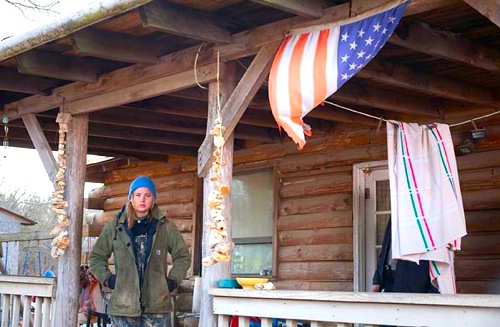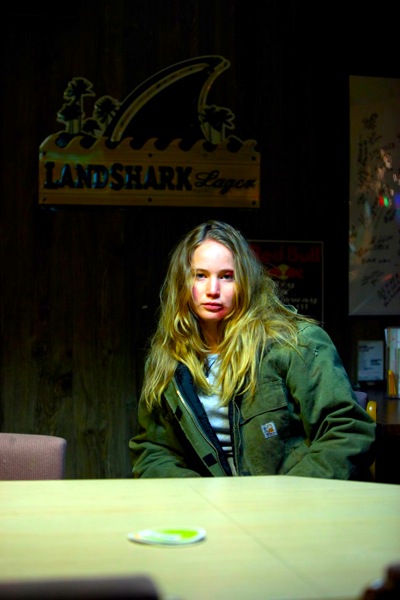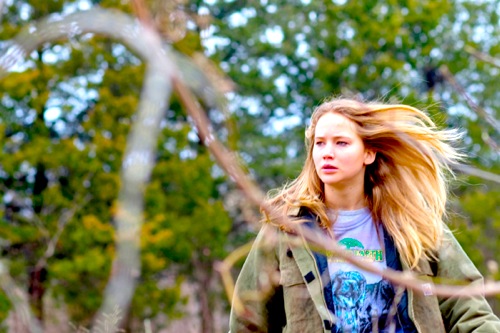
[LFM welcomes a new contributor today, Patricia Ducey, an LA-based screenwriter and film essayist whose work we’ve admired over the years. Her screenplay on Germany’s Baader-Meinhof gang was a finalist in the 2006 Liberty Film Festival screenplay contest. We’re glad to have her on board.]
By Patricia Ducey. Winter’s Bone (written by Debra Granik and Anne Rosellini, directed by Debra Granik; see the trailer here) garnered the Sundance Film Festival’s top award this year and received near universal critical praise, especially for young actress Jennifer Lawrence as the central character of Ree Dolly. Some have called Winter’s Bone a crime story, a western, a quest, or even a ‘country noir’—a definition that Daniel Woodrell, author of the original novel, might quibble with – but noir seems accurate enough. The film has a chilly atmosphere, shot in the relentless gray of winter, in perpetual twilight filtered through bare-limbed trees. We sense there are dark secrets in these hundred-year-old woods that are about to be disturbed.
The film introduces us to teenager Ree Dolly and her web of extended kin who eke out an existence in the Missouri Ozarks with a little ranching and a lot of ‘cookin’ (methamphetamine production). Ree is the sole provider for her two younger siblings and a nearly catatonic mother, since her father Jessup has run out on his bail bond when faced with a long stretch in prison for drug offenses. If Jessup doesn’t show up for his sentencing in one week’s time, the bondsman will take the ranch as collateral – and Ree and the family will be homeless.

A cinematic set-up like this usually prompts an “uh-oh” for anyone hoping for more than another cringe-inducing anthropological foray into the backwoods. Kudos to writer/director Debra Granik, though, for taking pains to avoid the usual stereotypes of flyover country in several key aspects of the story, especially in Ree’s complex character.
Ree may be desperate for money, all right, but she reaches neither for the government teat nor for the family business of ‘cookin’ – the easiest ways to make a quick buck – because she does not see her or her family as victims of society entitled to an easy way out. Instead she sets out to find Jessup, dead or alive, and bring him back to justice. Ree has little but her own sense of honor and family duty to carry her, but that’s enough.
When Ree runs into the wall of silence from the local drug dealers (most of them are Dolly relations), she decides to enlist in the Army instead for the $40,000 bonus. The local Army recruiter, surprisingly, is presented as a sympathetic character: he probes her motives and actually talks her out of enlisting. He counsels Ree that she needs a better reason than the money to enlist, and it may be best to tend to her family for now. Watch closely for an early scene depicting the ROTC and the baby-tending classes at the high school. A PA announcement for college advising plays over the ‘two bad choices’ visual, indicating that the military here is a choice – not a dead end.
Ree is always aware of the precariousness of her position and uses every opportunity to teach the young siblings elemental survival skills – as someone probably taught her. The kids may not be able to feed themselves now, but when she’s through, they will. Ree instructs them on the finer points of cooking a good breakfast and how to squeeze a rifle trigger; how to hunt, skin, and fry a squirrel. A gun is a tool for survival, no more and no less, in a place where people live close to the land.
In Ree Dolly, Debra Granik has created an authentic character rooted in respect for the people that settled the Ozarks – the people Jim Webb, for one, has written about – with their determined individualism and dislike of authority, their almost contrary traditions of family and military. When Ree’s Uncle Teardrop urges her to sell off her forest acreage before it’s taken from her, for instance, she balks. At her lowest point, she has a nightmare of that forest being cleared with fire and chainsaw, and we realize what Ree fears much more than the loss of her house – she fears the loss of her entire history. Maybe addict Teardrop has lost his soul to drugs, but she hasn’t.

The real quandary of the movie thus is not so much whether or not Ree will find her father Jessup, but whether or not she can retain her essential values. Ree walks a narrow line: she goes against the Dolly blood she shares with her cousins, yet she stands her ground against outsiders (like the police), proudly declaring she is a Dolly through and through.
At the end, Ree Dolly – part pioneer woman and part Luke Skywalker – reaffirms the best of the values she holds dear, and finds joy in embracing something bigger than herself. As she assures her two siblings: “I’d be lost without the weight of you two on my back. I ain’t going anywhere.”
Winter’s Bone is not perfect: the gruesome climax is so over the top it draws a few nervous laughs, and Ree is almost preternaturally fearless for the first two acts. But from Debra Granik’s careful attention to detail, and judicious use of song and spoken word – to a story that flows from life, and not just other movies – she has made a film that speaks of a particular place and a special young woman, and so manages to rejuvenate a genre that has long since devolved into hillbilly pastiche. This is a film any viewer can appreciate.
Winter’s Bone is now playing in select theaters.
Posted on June 30th, 2010 at 1:14pm.
I’m surprised they would treat the American South respectfully. How did this make it through Sundance, again?
oh i really like this one, and j. lawrence has a good future for herself if she doesn’t sell out! i thought the film was a little too long, though, given the payoff that didn’t quite work for me. so glad you guys reviewing this.
We’re always happy to review indie films, in large part because they need it the most. Keep coming back to LFM.
I will admit that I’ve never been to the Ozarks, but the trailer did not entice me to change that situation. Still, I’m glad to see flyover country getting some love from Sundance.
Great review Patricia! I will have to check this out. It’s nice to see a gal in a film who is self reliant and not an airhead. I’m also very tired of the stereotypes of people who live in “flyover” country … they’re not all hicks and morons. The film’s success just shows you that people are looking for something different nowadays than the usual Hollywood hooey.